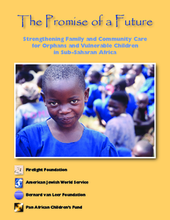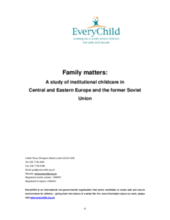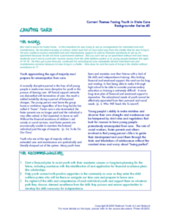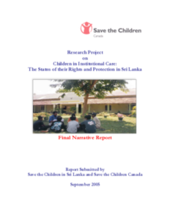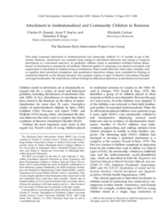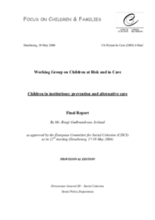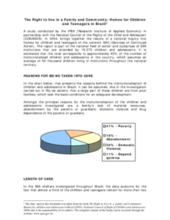Displaying 681 - 690 of 721
A brief document advocating for the strengthening and support of community based responses to children and families affected by HIV/AIDS in Africa.
This paper analyses the financial costs of residential services as compared to community-based services in Moldova. It also addresses the negative effects of institutional care on the well-being of children and society as a whole.
A report discussing the advent and perpetuation of institutional care in Central and Eastern Europe and the Former Soviet Union prior to and since the end of the communist regime. It also provides examples of family-based care as models of care to substitute institutional care and offers recommendations to donors, NGOs and governments for child care reform based on their experience in CEE and FSU.
This one-page document identifies some difficulties that youth face in leaving institutional care. Offers recommendations to assist financial, emotional, and educational preparation for emancipation.
A situation analysis of children in institutional care that includes policy implications and key recommendations.
This study examined attachment in institutionalized and community children 12 – 31 months of age in Bucharest, Romania.
This report contains an overview of alternative care in Europe, the effects of institutions on children, statistical information and the different approaches of child protection systems within Europe. It includes reforming institutional care, foster care, post-care support, and the role of the social worker.
This research study provides statistical information on institutional care of children under the age of 12 in Brazil. Interviews with institutions and children are conducted, and reasons for separation from family, length of time in care, status of family relationship, religious orientation and financial support of the institutions are highlighted.
An informal evaluation of an NGO residential institution in Zimbabwe, based on the opinions of the child residents. Includes recommendations for the improvement of residential care.
Analyzes the state of institutional care in Zimbabwe against the national child protection policy. Focuses on the role of donors in the proliferation of institutional care and strategies to better regulate the development and provision of child protection services.

